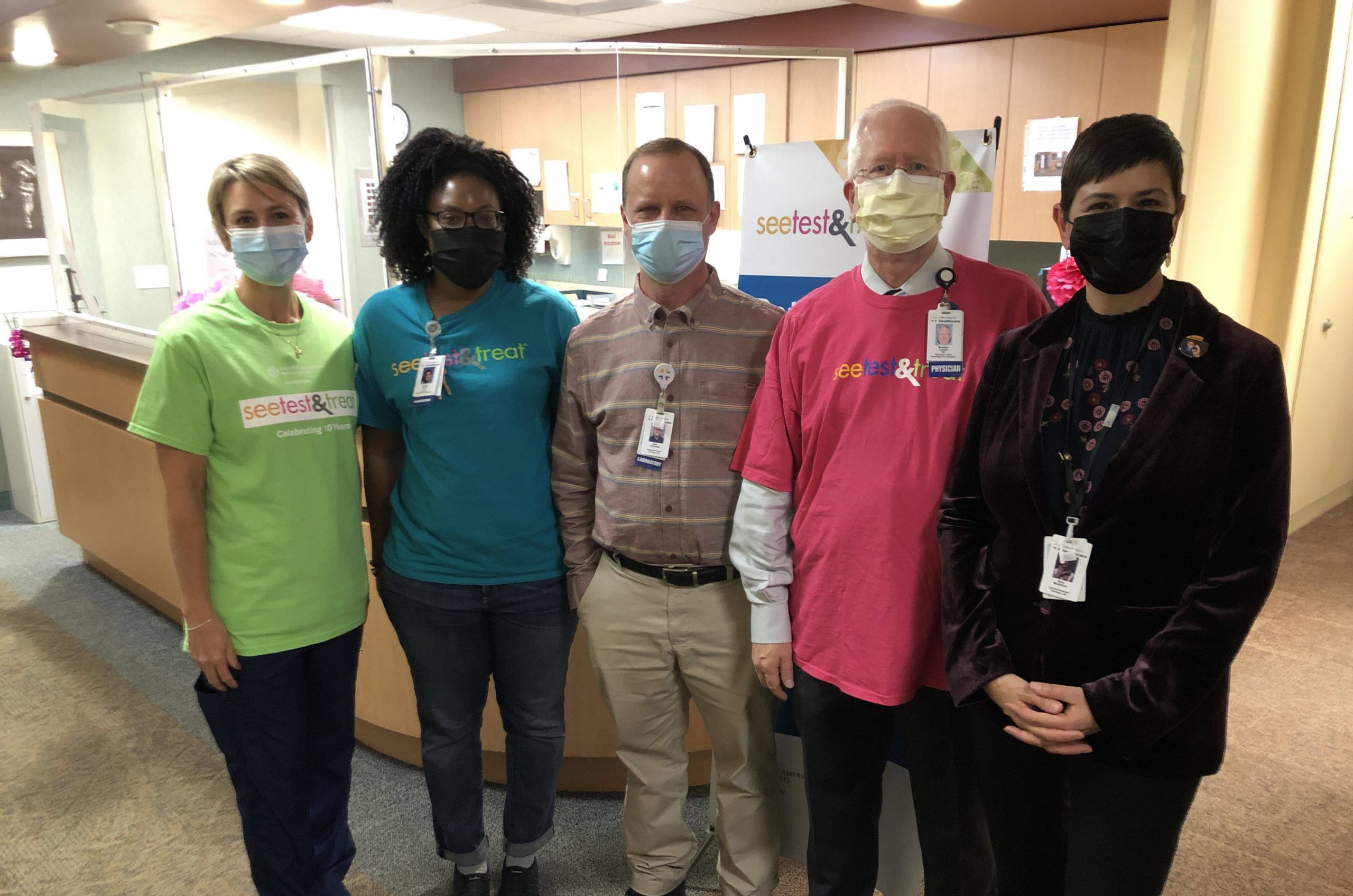NorthPoint See, Test & Treat Connects Outliers to Care
On an early Saturday morning in October, the overcast sky spitting rain on North Minneapolis didn’t deter the volunteers bustling inside NorthPoint Health and Wellness Center.
Tee McClenty, manager of outreach and health initiatives at NorthPoint, was all smiles as she corralled a dozen or so volunteers setting up signs, information booths, check-in stations, and tables of healthy snacks. She has overseen NorthPoint’s See, Test & Treat program for three years now and, like the rest of the volunteers, has come to look forward to the event.
“It can be a lot of work for everyone, but we also have fun while we’re reaching out to our community,” McClenty said.
Bradley M. Linzie, MD, FCAP, pathologist with event partner Hennepin Healthcare, agrees that while See, Test & Treat is a singular program for its free cancer screening and patient outreach, it’s also an event that highlights health care professionals and builds comradery.
“The people that work here like it,” Dr. Linzie said. “It’s a celebration of what they do, in a sense, so they’re motivated.”
“And the T-shirts—they love them. You can’t imagine what people will do for a T-shirt,” he added with a laugh, showing his own bright pink See, Test & Treat shirt.
Snacks, smiles, and shirts aside, volunteers at NorthPoint on October 2 were serious about providing essential health services and education to their community.
Organizers at NorthPoint and their partner organizations like Hennepin Healthcare and SAGE with the Minnesota Department of Public Health have been hosting See, Test & Treat events since 2006—a few years after the first-ever event and four years before the CAP Foundation began overseeing the program.
The NorthPoint program has evolved over 10 iterations, but organizers have always made their medically at-risk communities a priority. Tailoring their program to serve Black, Latino, and Hmong communities in the area, NorthPoint’s See, Test & Treat provides interpreters to help clinicians effectively and comfortably communicate with patients.
In the past, NorthPoint and its partners would hold a three-day health fair event with each day specifically focused on a different population. In 2021, the program tried out its first single-day event to minimize costs and worker requirements. The approach worked, with NorthPoint screening 47 patients while also providing necessary translation services.
And while cervical and breast cancer screenings are a main benefit of the event, Dr. Linzie said See, Test & Treat is truly unique as a platform for community outreach. Citing Minnesota’s abundance of health care options available to uninsured and underinsured people, Dr. Linzie said, “In my mind, our event isn’t as much about saying we’re going to get everyone a Pap smear, although that’s great when we can. It’s more about awareness and demystifying and welcoming the communities that don’t necessarily always feel that kind of inclusion.”
[Our event is] more about awareness and demystifying and welcoming the communities that don’t necessarily always feel that kind of inclusion.
According to Dr. Linzie, institutions like NorthPoint work hard throughout the year to connect people in their communities to health and social services. He says a large portion of people are already tied into a care system that works, but the challenge is connecting with the outliers who may not be aware of the services available.
“But it’s still something that everybody needs to be reminded of,” Dr. Linzie said. “It gets so routine; people don’t appreciate it anymore. You’ve got to keep the conversation going.”
Johnnie Rodgers, a patient from Minneapolis who was screened at NorthPoint, knows the importance of preventative care. She’s a cancer survivor. “I want to keep check [so] that if something does happen to me, we can catch it early,” she said.
Alongside the cancer screenings at the event, organizations from around Minneapolis are there to inform the community on other health and social safety resources available to them. See, Test & Treat volunteers guided patients from their screenings to talk with representatives from Ucare, MNsure, and Blue Cross Blue Shield to discuss Medicaid and other insurance options.
The Cora McCorvey Center provided information on everything from public housing to free yoga classes. There was also information available on sexually transmitted infections and diseases, as well as NorthPoint resources for seniors and people with disabilities.
“The education is a special experience that’s memorable, and they’ll talk about it,” Dr. Linzie said. “Maybe also plug in some people who didn’t know about the clinic, and when they have a good experience, they come here for everything else.”
While patients perused the booths and grabbed a snack, the laboratory team processed their Pap smear samples. Alongside lead pathologist Dr. Linzie was pathologist Sophia Smith, MD, FCAP; lead cytotechnologist Denelle Hygrell; and cytotechnologist Kathryn Hughes with Hologic, which partners with the CAP Foundation to provide diagnostic resources and equipment.
Once samples have been treated with the necessary chemical stains, the laboratory professionals are able to analyze the cells, looking for abnormalities that could be signs of infection or disease.
After the team makes their diagnosis, patients are given the opportunity to view their samples with a pathologist through a high-definition camera attached to the microscope. This setup, Dr. Linzie said, was procured through funds from the Herbek Humanitarian Award and allows patients a rare, up-close look at their tissue.
“[The patients] are generally just amazed to see their own cells,” Dr. Linzie said. “It’s like science class …they’ll remember it forever.”
He added, “There’s nowhere else in America where you can have your Pap smear results the same day and see it. No matter how rich you are, you can’t get that.”


